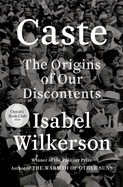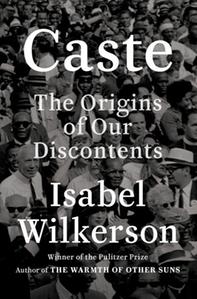
 Pulitzer Prize-winning journalist Isabel Wilkerson (The Warmth of Other Suns) offers a singular and vital perspective on American society with Caste: The Origins of Our Discontents. This examination of caste and its consequences on every aspect of culture is unusual, eye-opening and of life-or-death importance. As in her previous work, which she continues and deepens here, Wilkerson lives up to the scope and significance of her subject matter, delivering a book that is deeply researched, clearly structured, well-written and moving.
Pulitzer Prize-winning journalist Isabel Wilkerson (The Warmth of Other Suns) offers a singular and vital perspective on American society with Caste: The Origins of Our Discontents. This examination of caste and its consequences on every aspect of culture is unusual, eye-opening and of life-or-death importance. As in her previous work, which she continues and deepens here, Wilkerson lives up to the scope and significance of her subject matter, delivering a book that is deeply researched, clearly structured, well-written and moving.
The root of so many social ills in the United States, Wilkerson argues, is not precisely racism but casteism, which is closely linked to the concepts of race invented and reinforced since before the country's founding. "Caste and race are neither synonymous nor mutually exclusive," she writes, and then explicates and defines her terms precisely, with the support of exhaustive research. "Caste is insidious and therefore powerful because it is not hatred, it is not necessarily personal. It is the worn grooves of comforting routines and unthinking expectations, patterns of a social order that have been in place for so long that it looks like the natural order of things."
Wilkerson interrogates and defines caste systems by comparing and contrasting three: those of Nazi Germany, India and the United States. The job of analyzing more than 400 years of American history, social structures on three continents and the complexities of sociology, psychology, history, anthropology, philosophy and more is an enormous one, but Wilkerson is more than capable. She lays out eight pillars of caste, including divine will, heritability, occupational hierarchy, and terror as enforcement. She puts to work a number of convincing metaphors to illustrate her points: infectious disease, the challenges of owning an old house, actors (mis)cast for a theater production, rungs on a ladder, the biblical concept of the scapegoat. She uses a new vocabulary to recast old problems, usually referring not to terms of race or class but of caste, and discusses recent electoral politics with descriptions rather than names, defamiliarizing the familiar and thereby offering her reader a fresh perspective.
Wilkerson's understanding of caste proposes a nuanced take on the Trump election: many working-class white voters did not in fact vote against their interests, but rather prioritized one interest--upholding the caste system--over others, including access to health care, financial stability and clean air and water. She effectively argues that while "caste does not explain everything in American life... no aspect of American life can be fully understood without considering caste and embedded hierarchy," and shows how it causes psychological and physical health damage to everyone living within this system.
Caste is a thorough, brilliant, incisive investigation of the often invisible workings of American society. Original, authoritative and exquisitely written, its significance cannot be overstated. --Julia Kastner, librarian and blogger at pagesofjulia
Shelf Talker: In this meticulously researched and beautifully crafted book, Pulitzer Prize-winning journalist Isabel Wilkerson argues that the U.S. has a race-based caste system.

